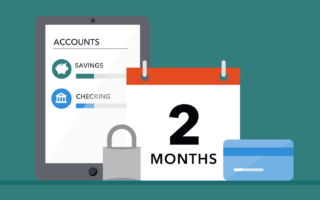Reading time: 5 minutes Updated: February 16, 2024
First published: June 14, 2021

Your credit score depends on the unique scoring model used by credit bureaus and lenders. Learn more about the different types of credit scores.
There are many different types of credit scores that are used for different purposes, and they all vary based on the data they are calculated from.
The three major credit bureaus collect data independently and may use proprietary formulas to calculate credit scores, such as payment history and credit mix.
The time it takes to pull your credit report can affect your credit score.
When lenders ask the three major credit bureaus (Experian, Equifax, and TransUnion) for your credit score to predict your credit risk, you get a score between 300 and 850.1 The higher the number, the better your chances of getting approved for credit cards and loans, and the lower the interest rate you can receive.1
But your credit score may vary by credit bureau . 1 How is this possible?
When recording your credit history, the credit bureaus generally use the same scoring model — usually FICO 2 — but they work independently, don’t share data, and have proprietary algorithms that weigh and calculate the five main factors that make up your credit score: payment history, credit utilization, and the amount you owe. , credit age/history, credit mix and new credit . 3 In addition, there are many different credit scores.
Different credit scores: basic and industry-specific scores
Because the credit bureaus use similar scoring systems to calculate your credit risk, if you have a high score at one credit bureau, you may score high across the board. Scores can vary by several points, but since credit bureaus use several versions of credit scores, they are further divided into two main categories: basic scores and industry-specific scores . 1,3 Lenders decide which version of credit scores to use when evaluating your credit risk . 4
Basic credit scores help predict your likelihood of repaying your agreed-upon credit obligations, whether it’s a loan, credit cards or student loans.1 There are many historical versions of basic scores, and lenders generally don’t need to upgrade to the latest 5-step . score, which means that even though FICO Score 10 was released in early 2020, lenders can still use FICO Score 8. Industry-specific scores are optimized for lenders, who may request your credit score to assess the risk of certain loan obligations. Like car loans, mortgages and insurance companies 6
While Basic Credit Scores and Industry-Specific Credit Scores use the same scoring model, their algorithms can be adjusted for more targeted risk assessment for lenders. There are 20 different FICO score models that lenders can use . 7 Your score may vary depending on the lender’s criteria . 4 In other words, your FICO score at the car dealership and the bank may be different, even though both will consider you for a car loan . 4
Time and source of information affect credit scores
Your credit reports are often updated when the credit bureaus receive information from your creditors, so for example, they may change when you pay off your credit card bills – because payment history and credit utilization are factors that affect your creditworthiness . 8 However, credit scores are not necessarily pulled at the same time, so your credit files from the three credit bureaus may contain different information at a given moment – some of which may no longer be up to date . 1
Although all three credit bureaus use the same credit scoring model, there can be inconsistencies between credit scores due to differences in data, meaning your score can sometimes fluctuate by 20 points or more . 9 That’s why lenders and creditors who want to assess your risk and know your past financial history sometimes ask for scores from all three agencies and then use an intermediate score when making a decision about your credit or loan . 9
Most lenders, credit card companies, and other financial institutions provide monthly financial information reports to all three credit bureaus, but they don’t always share the same information . 8 Just as time changes, so does the information provided by different credit reports, which can affect how your credit score changes . 10 For example, a collection account may appear on one credit report but not on another. This negative information (collection accounts, foreclosures, and delinquencies, what the credit bureaus often refer to as “enforceable” items) is considered part of your payment history and carries more weight than other factors and can negatively impact your credit score . 11
What is a “judgmental” credit scoring model?
If you deal with a small bank, they may use a “judgmental” credit scoring model to assess your creditworthiness. Like FICO’s statistical model, which automatically matches and assigns weights to data factors, a judgment model is used to assess credit risk based on the lender’s knowledge, often a person manually scoring many of the criteria used in a statistical model. 12
But a judgment credit score isn’t as common as it used to be. Statistical credit score models are ideal for helping lenders make quick, accurate and unbiased decisions in minutes or days on everything from mortgage applications to extending credit card lines.
There are several reasons why you may have different credit scores. First, the three major credit bureaus operate independently and use proprietary algorithms to calculate key factors for your score. They also use multiple versions of their base and industry-specific scores, and lenders decide which version to use when assessing the risk of a particular type of debt. Additionally, lenders don’t always share the same information at the same time, and credit scores aren’t always available at the same time—all of which result in different types of possible credit scores.
1 “What is a credit score?” Consumer Financial Protection Bureau
2 “What is a FICO® Score?”, MyFICO
3 “Credit Scores”, Federal Trade Commission
4 “Why do I have so many credit scores?”, Expert.
5 “Which Credit Score Matters Most?”, Expert.
6 “FICO® Score Version”, MyFICO
7 “FICO® Score Study”, FICOScore
8 “How often will my credit score improve?”, Experian
9 “What Are the Different Credit Score Ranges?”, Expert.
10. “Why does my credit score differ with different credit bureaus?”, Experian
11 “What Does ‘Distress’ Mean on a Credit Report?”, Expert.
12 “Comment 2(p)-4,” Consumer Financial Protection Bureau
Randy Golin is a freelance writer and editor covering shopping, travel, dining and food topics for tech and media brands and digital publications.
All Credit Intel content is written by freelance writers and commissioned and paid for by American Express.


